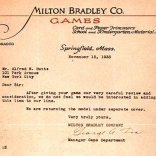What does caziques, a Native American chieftain, and quixotry, meaning visionary schemes, have in common? And what has this to do with Alfred Butts? Well Alfred Butts was an inventor of a board game ……
Alfred Mosher Butts, an architect in Jackson Heights, New York, enjoyed chess, crosswords and word games. After he lost his job at Holden McLaughlin and Associates in 1931 during the Great Depression, he set out to design a word game that utilized both chance and skill by combining elements of anagrams and crossword puzzles, a popular pastime of the 1920s. He studied the front page of The New York Times to calculate how frequently each letter of the alphabet was used so as to determine how many of each letter he would include in the game. He found that just 12 letters (E, T, A, O, I, N, S, H, R, D, L and U) accounted for 80% of the letters that are normally used. Although ‘S’ was a very common letter, he decided to only include four ‘S’ tiles to avoid making the game too easy by having too many plurals.
Butts called the game ‘Lexiko’. Players would draw nine lettered tiles from a pool of 100 tiles and then attempt to form words from their letters. It was initially played without a board. Scores were calculated according to the length of the words formed. The first players were Mr Butts, his wife, Nina, and their friends. Mrs Butts was better at the game than her inventor spouse, and he admitted that she ‘beat me at my own game,’ literally.

The rejection letter from Milton Bradley Co for Alfred Butts’ first game, Lexiko. Parker Brothers also rejected Lexiko. 56 years later, Milton Bradley purchased the North American rights to Scrabble.
In 1933 Butts unsuccessfully tried to register the trademark of his new board game, and he approached all the major games manufacturers, including Milton Bradley and Parker Brothers, but they rejected the game. He changed the name to ‘IT’, then to ‘Criss Cross’, and in 1938, he changed it again to ‘Criss-Cross Words’. He added the 15×15 square gameboard, reduced the number of tiles held at time to seven, and changed squares to double or triple the value of the letter or word placed on them. Butts manufactured some 200 sets himself, $2 a set plus 25 cents for shipping, but again the games manufacturers were not interested. By then Butts was again employed as an architect and he put aside his efforts to develop the game, which was relegated to a novelty played by a handful of people.
In 1948, Butts sold the rights of his game to James Brunot, a Federal official and social worker, who had a friend who had bought one of Butts’ handmade sets. Butts, as the inventor, retained the patent rights of the game and earned royalties on each set sold. Brunot added the 50-point rule for playing all seven tiles at once, changed the colours on the board, and came up with the name Scrabble, a word meaning ‘to scrape or grope around frantically with your hands’ from the Dutch ‘schrabben’ to scrape or scratch.
